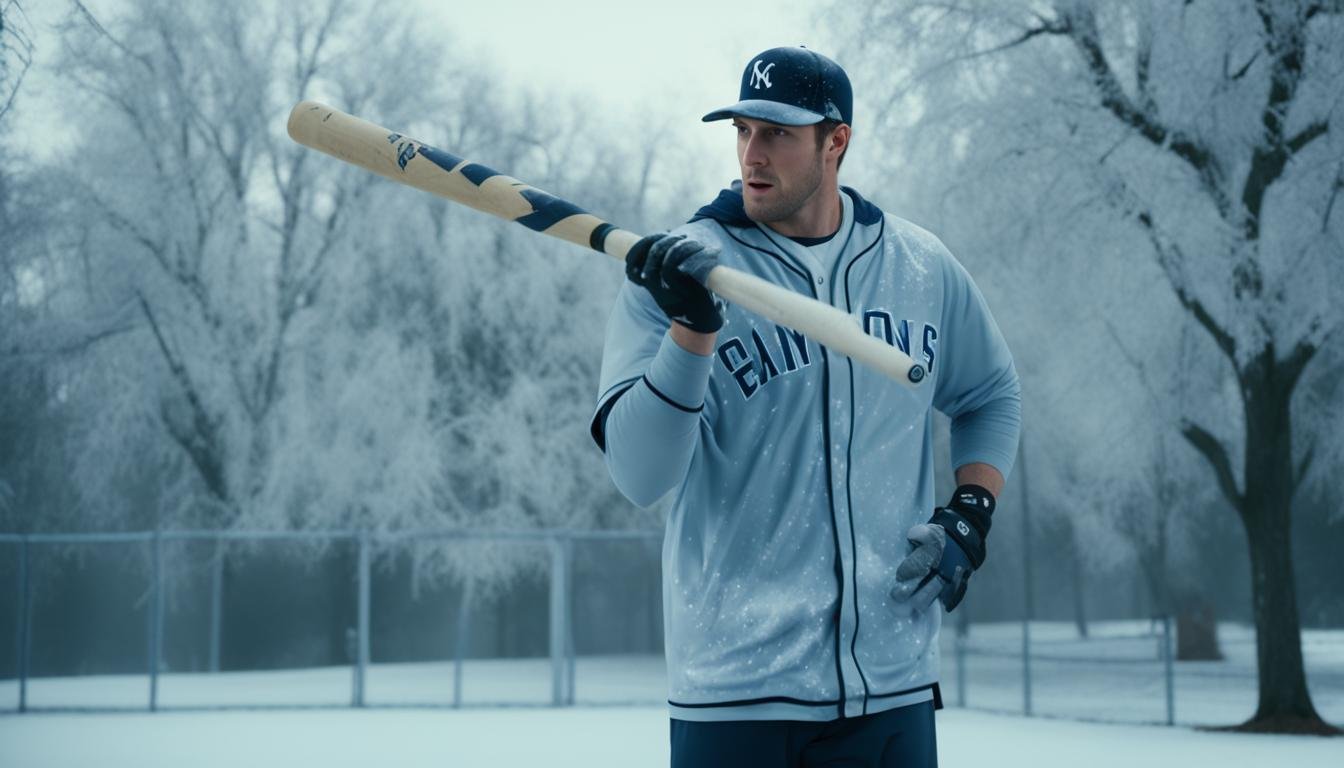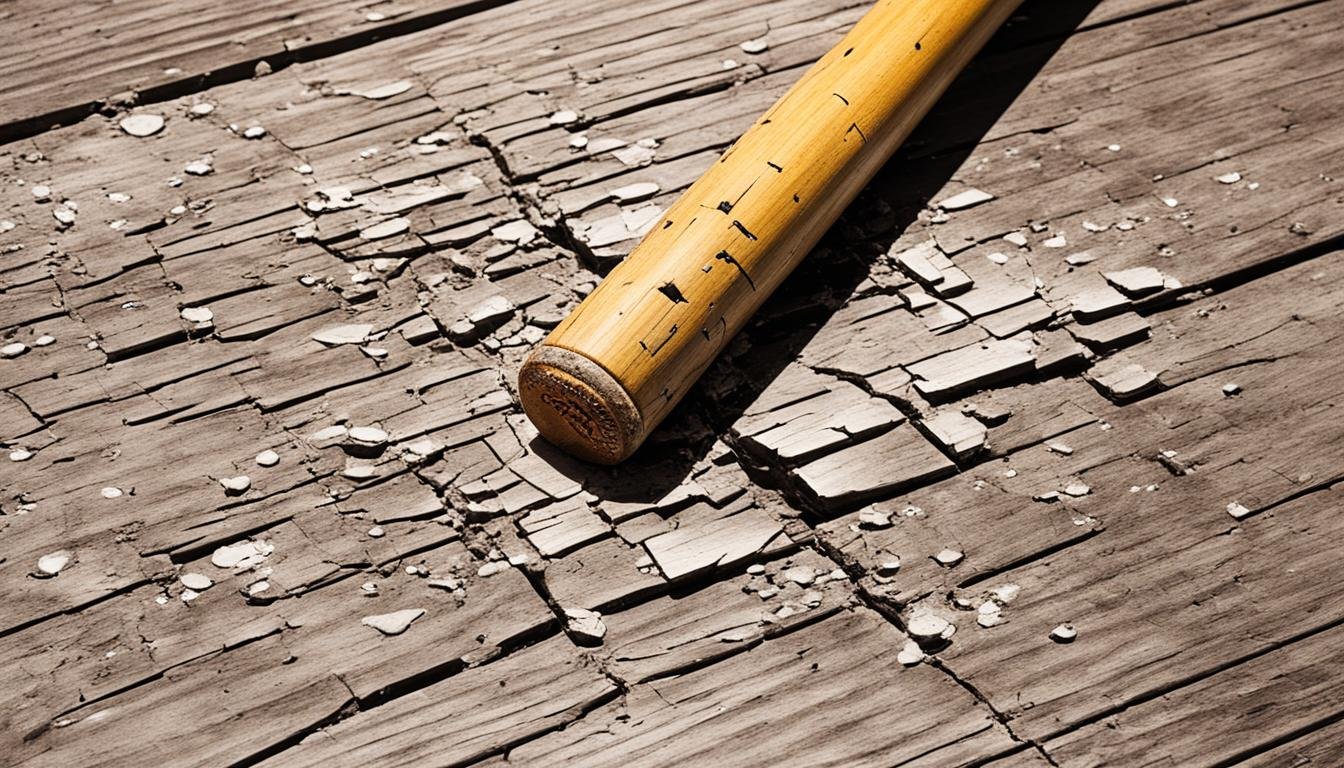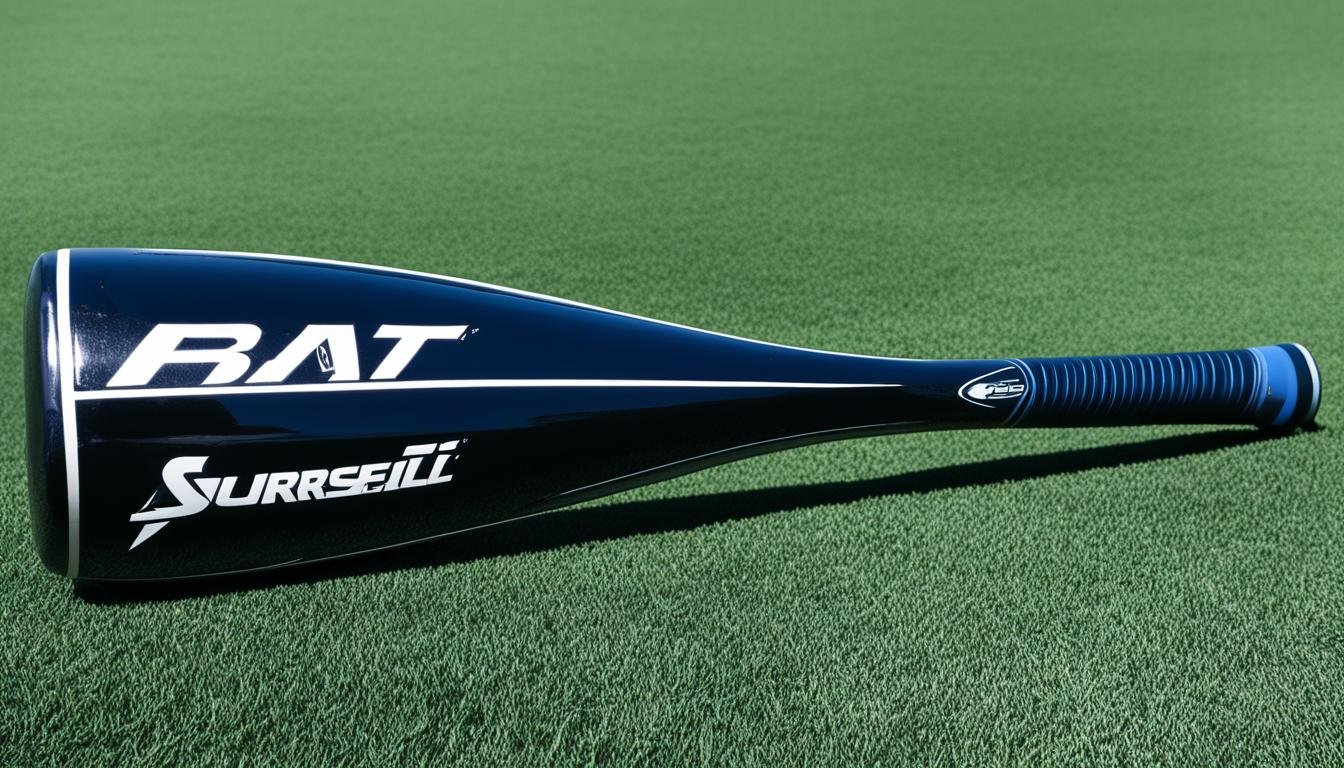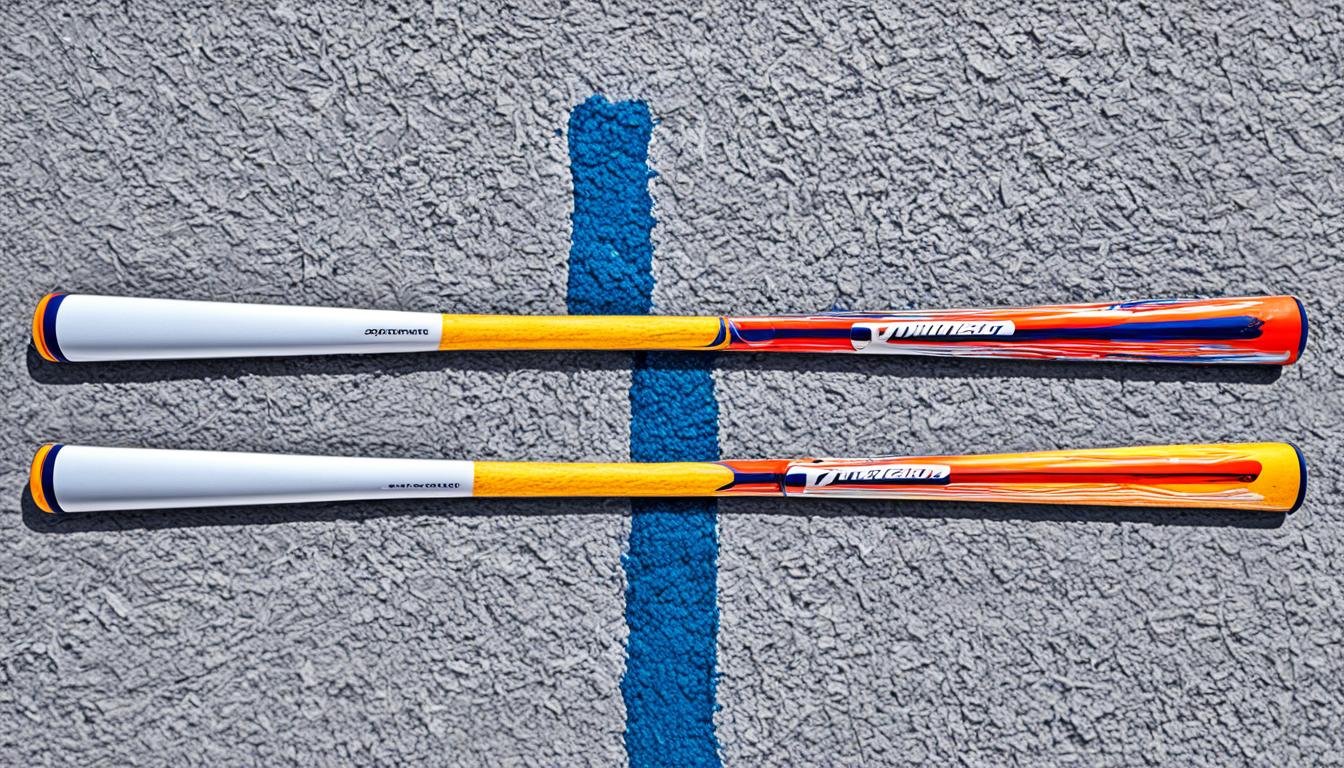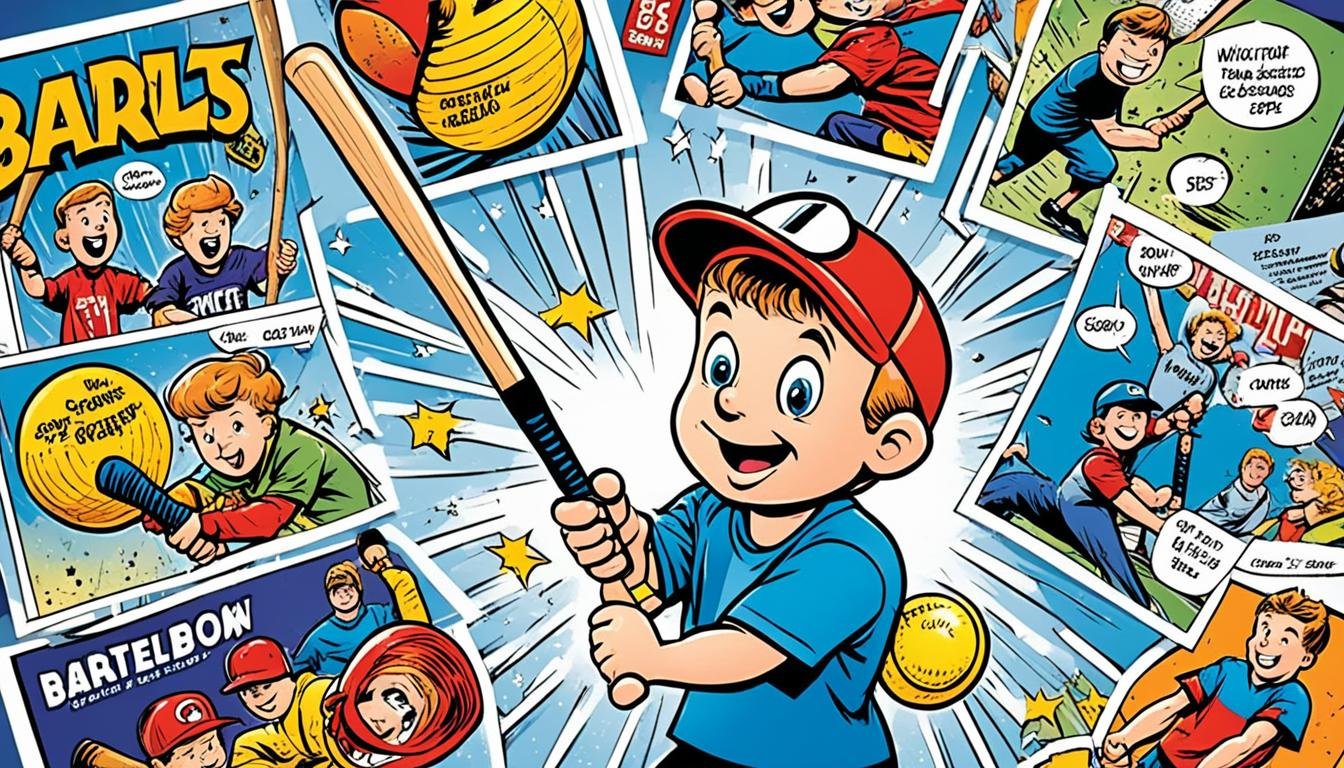What Are The Safety Tips For Using A Baseball Bat In Cold Weather Conditions?
Yogi Berra once said, “It gets late early out there,” reminding us that bad weather can surprise even the best players. Playing baseball in the cold means you must focus on cold weather baseball bat safety. The cold can change your swing and affect your gear, making it key to follow winter baseball bat precautions. Knowing how cold weather changes bats can improve your game and lower injury risks. This guide will share important tips for using a baseball bat in the cold, keeping you and your gear safe. For more info, check out the resources here1.
Key Takeaways
- Cold temperatures can affect the durability and performance of baseball bats.
- Composite bats should not be used below recommended temperatures to avoid damage.
- Regularly checking your bat’s condition can prevent accidents on the field.
- Wearing the right protective gear is crucial for player safety in winter conditions.
- Incorporating warm-up routines before games can help maintain agility.
Understanding Cold Weather Effects on Baseball Bats
Cold weather changes how baseball bats perform and last. When it’s under 65 degrees Fahrenheit, bats may not hit as well because the ball gets harder. This hardness and the cold can make the bat more likely to break during a game2. Composite bats are very sensitive to the cold, becoming brittle and more likely to crack3.
Most bat makers say to avoid using bats below 60 degrees Fahrenheit. Some even advise not to use aluminum bats when it’s around 50 degrees4. Aluminum bats often get dented in the cold, and composite bats are more likely to crack4. Taking good care of your bat in the cold is key to keeping it in good shape.
Knowing how cold weather affects baseball bats helps you protect your gear. Keeping your bat warm, with bat warmers or in a warm place, can reduce the chance of it breaking. Remember, a 1-degree change in temperature from 72 degrees changes the ball’s compression by 5 pounds, affecting how it hits the bat2
Why You Should Avoid Using Composite Bats in Cold Weather
Using composite bats in cold weather can cause big problems. These bats are made of carbon fiber, fiberglass, and graphite. They work well in mild weather but not in the cold.
Breaking and Durability Issues
Cold weather makes composite bats more likely to break or crack. If it’s too cold, below 50-85 degrees Fahrenheit, you risk serious damage. This can lead to bad performance and high costs5.
Using harder baseballs in the cold makes it even worse. This can cause the barrel to crack when you use these bats5.
Recommended Temperatures for Bat Use
It’s best to avoid using composite bats in cold weather. They work best when it’s over 60 degrees Fahrenheit. To make your bat last one to three seasons, follow these temperature guidelines6.
Keep them in a stable place and don’t use them in the cold. This will help them perform better and last longer6.
Knowing how composite bats perform in the cold helps you make smart choices. This way, you can avoid damage and keep your season fun6.
Safety Tips For Using Baseball Bat In Cold Weather
Playing baseball in the cold requires cold climate bat safety to be a top priority. It’s vital to check your bat often to make sure it’s ready for the cold. Cracks or damage can worsen in the cold.
Regularly Check the Bat Condition
Checking your bat often helps spot wear and tear early. Composite bats, in particular, can get brittle in the cold. This can lead to bad outcomes during games7.
Use Appropriate Bats for Low Temperatures
Choosing the right gear is crucial for precautions for using a baseball bat in chilly weather. Opt for alloy or wood bats for the cold. Avoid composite bats in cold weather as they can break easily7. Composite bats work best in temperatures between 50-85 degrees Fahrenheit for the best performance8.
Wear Proper Gear to Keep Warm
Wearing the right clothes keeps you warm and focused, preventing injuries. Thermal gloves and layered clothing help keep your body heat in. Being well-prepared boosts your performance and keeps you safe.

Best Practices for Cold Weather Baseball Bat Use
When it gets cold, knowing how to use a baseball bat in the cold is key. It helps with both performance and safety. The right warm-up and gear can really change the game.
Warming Up Effectively Before Games
Warming up before games is a must in the cold. It gets your blood flowing and muscles ready. Doing dynamic stretches and light exercises can prevent injuries and get you game-ready.
Using Batting Gloves for Additional Grip
Batting gloves are great for cold weather. They keep your hands warm, help you keep control, and make handling the bat easier. They also reduce shock when hitting a cold baseball, which can boost your performance.
Keeping your bat in good shape in the cold is important. Always check for wear and fix small issues to make it last longer. For tips on caring for aluminum bats, check out this link9.
Keeping Your Bat Safe from Cold Damage
Dealing with cold weather means you need to protect your bat. Proper storage and care can help your baseball or softball bat last longer.
Storage Tips for Cold Weather
Keep your bat in a place with a steady temperature. Always take your bat inside after practice. Don’t leave it in your car or outside where it gets very cold.
This keeps your bat safe from the cold. A well-kept bat will perform better and last longer. It also avoids damage from cold stress on the materials.
Avoiding Cold Stress on Materials
In cold weather, the temperature affects your bat’s materials. The cold can make composite bats more likely to break. Use older alloy or wood bats instead, as they handle the cold better.
These steps will help you take good care of your bat in the cold. Check out this guide for the best bats for cold weather10.
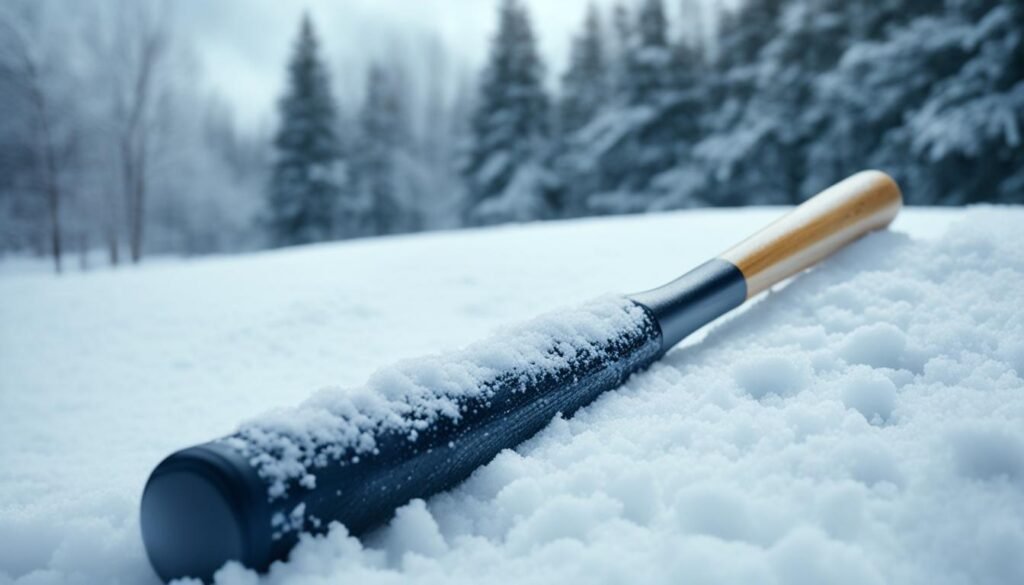
Winter Baseball Bat Maintenance Tips
When the cold weather hits, taking care of your baseball bat is key. Keeping your bat in top shape is crucial for practices and games. Always clean your bat after use to prevent moisture and dirt build-up. This simple step helps avoid corrosion and damage.
Cleaning and Care After Use
After using your bats in winter, make sure to clean them well. Use a solution of water and mild cleaner for aluminum bats. Wooden bats should be cleaned with a wood-safe cleaner. Check the barrel for dirt and look for any cracks, dents, or wear.
Regular cleaning helps prevent damage. Many bats need cleaning after a season because they’re covered in dust and dirt11.
Proper storage is also key. Keep your bats in a dry, climate-controlled spot to avoid damage from extreme temperatures11. Storing bats wrong can cause them to crack, especially wooden ones12. Follow these tips to keep your bat ready for your next game.
Protecting Yourself from Injuries in Cold Weather
Playing baseball in the cold requires careful techniques to avoid injuries. Make sure your grip on the bat is tight and your hands stay warm. This helps you control the bat better and stay safe.
Proper Grip Techniques
To prevent slipping, practice a firm grip before swinging. Use insulated batting gloves made for cold weather. These gloves improve your grip and keep your fingers warm and agile for better performance.
For extreme cold, consider gloves that absorb vibrations. This can make playing more comfortable.
Managing Vibrations During Hitting
Vibrations from the bat can cause discomfort and injuries. Choose a bat designed to reduce vibrations. Look for bats with technology that absorbs shock to keep you focused and comfortable.
Wearing the right gear is key to safety in winter baseball. Being prepared for emergencies is also crucial for enjoying the game safely.
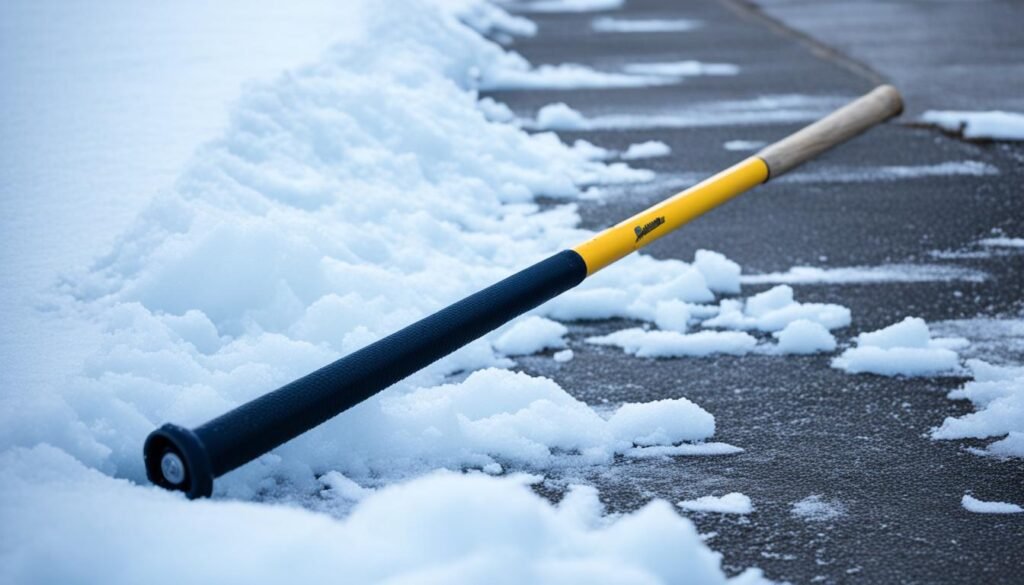
By following these tips, you make the game safer and more fun, even in the cold. For more safety tips, check out winter baseball safety tips for valuable advice13.
Choosing the Right Bat Material for Winter Conditions
When picking a bat for cold weather, knowing how different bats perform is key. The type of bat you use can affect its durability and how well it works. Let’s look at some options you might want to think about.
Comparing Composite and Alloy Bats
Choosing between composite and alloy bats is important. Composite bats are great in warm weather but can break easily in the cold. Alloy bats, however, are stronger in cold weather, making them a better choice for winter. For example, the Mizuno B20 Hot Metal Bat is a top pick for young players in winter, offering both strength and good performance14.
Wood vs. Composite Bats in Cold Weather
When it comes to wood versus composite bats in the cold, wood bats don’t last as long. Some leagues don’t allow wood bats because they break easily. But, some coaches like them for teaching good hitting skills. On the other hand, alloy bats are popular for their strong performance and resistance to the cold. Young players often do well with bats priced between $25 and $50, while more serious players might spend up to $4001415.
| Bat Type | Key Features | Price Range |
|---|---|---|
| Mizuno B20 Hot Metal Bat | Durability in cold, -13 drop weight | Competitive pricing |
| Metal Alloy Bats | Good performance, suitable for cold | $25 – $400 |
| Wood Bats | Limited lifespan, promotes hitting mechanics | $50 – $150 |
Knowing these differences will help you pick a bat that boosts your performance and safety in winter games. The right bat can make a big difference, keeping you competitive and safe16.
Training Tips for Cold Weather Conditions
When it gets cold, finding the right training tips is key to keeping your game strong. Indoor exercises help you stay active and improve your skills. Doing indoor drills for swing techniques keeps your swing mechanics sharp, even in the cold.
Indoor Drills for Practicing Swing Techniques
Being dedicated in your practice is crucial, especially indoors. Try drills like the Ceiling Flip or Rubber Ball Toss. This drill takes just 10 minutes and should be done every other day to build muscle memory.
Drills like the Behind the Back Hip Driver for 15 minutes three times a day also strengthen your basics. Mixing different drills creates a comprehensive training plan.
Utilizing Warm-Up Exercises to Stay Agile
Always warm up before intense practice. These exercises boost flexibility and get your body ready for more intense activities. Regular warm-ups improve blood flow and lower injury risks, making you ready for action.
Creating a routine with these elements ensures you’re making the most of your indoor time.

Keep your skills sharp with a mix of drills and warm-ups in your practice. Good training protocols make a big difference when you play outside again. Adjust your training for the season and focus on your swing techniques. This way, you’ll be ready to shine when outdoor games start. For more tips on choosing the right bat, see the guide on choosing baseball bats17.
Snow Season Bat Handling Precautions
When it’s snowing, taking care of your baseball bat is key. Icy conditions can damage your gear and increase the risk of getting hurt. Knowing how to handle these challenges can help you play safely and keep your bat in good shape.
Handling Equipment in Icy Conditions
Keep your grip steady in the snow or ice to control your bat well. Cold weather makes your grip weaker by 15%, making it harder to hold the bat18. Wear shoes with good grip to avoid slipping and falling. Snow and ice can cause 45% of winter baseball injuries18.
Follow snow season bat handling tips to keep your gear in check. Regular inspections can catch problems early. Cold weather makes baseball more risky, with a 30% increase in muscle and joint injuries18.
Using icy conditions baseball bat safety tips can lower the risk of accidents. Cold weather safety cuts baseball injuries by 40%18. Follow these tips for a safe and fun winter baseball season.
Cold Weather Baseball Bat Performance Tips
Knowing how cold weather affects your bat’s performance is key for any player. When it gets cold, your hits might not be as effective. The bat might lose its “pop,” making it harder to hit the ball well.
Every 1-degree drop from 72 degrees means a 5-pound drop in the ball’s compression2. This change is a big deal for how well you perform. To keep your bats in good shape, store them in a warm place. Using bat warmers can also help; they keep your bats at the right temperature and prevent breakage2.
Understanding Cold Effects on Bat Performance
When it’s cold, think about the type of bat you use. Composite bats can crack easily in the cold, so save your best ones for warmer days4. Try not to use bats when it’s under 60 degrees Fahrenheit. In fact, some makers say to avoid using aluminum bats even at 50 degrees4.
Using thin-walled aluminum bats in the cold can lead to dents and damage. This can be a real hassle and expensive. By understanding these issues and using the right tips, you can improve your game and make your bats last longer.
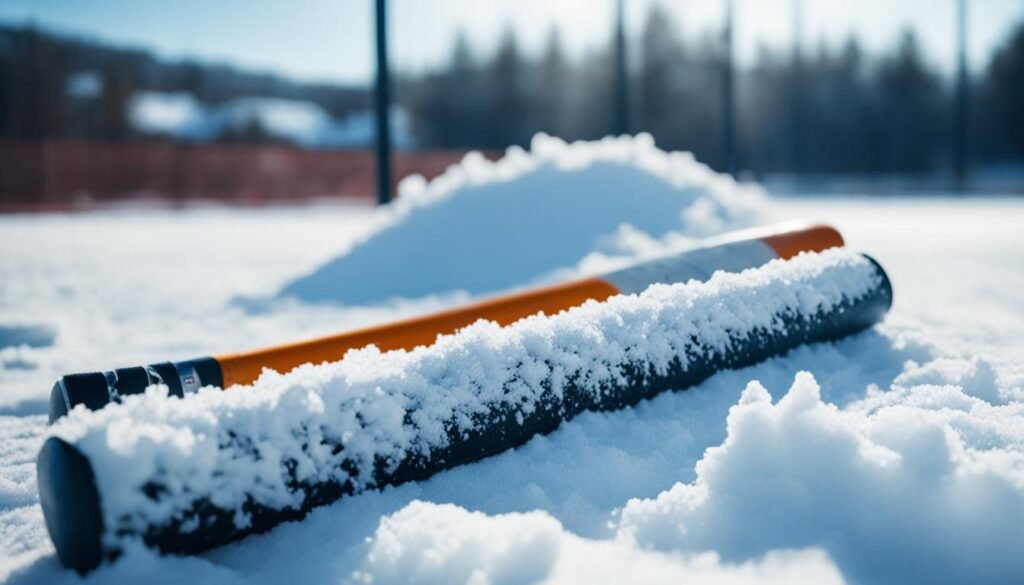
Staying Safe with Baseball Bats During Winter
Playing baseball in winter means you must focus on winter baseball safety. It’s important to know how cold weather affects bats and players. This knowledge helps you plan for your games.
Tips for Game Day in Chilly Weather
Get ready for the cold by wearing layers on game day. Thermal base layers keep you warm and dry. Then, add mid layers for extra warmth without losing flexibility.
Make sure your bat is in good shape before each game. Look for any cracks or dents that could cause injuries. Checking your bat often helps you follow winter bat safety tips and play well with safe gear to spot problems.
Monitoring Temperature Conditions
Watch the temperature before and during the game. If it’s too cold for bats, think about playing or changing your plan. Drinking warm drinks and using hand warmers can make you more comfortable in the cold19.
Talking with your team about the weather and how you’re doing is key. Being flexible keeps everyone safe and involved in the game20.

Conclusion
Taking care of your baseball bat in cold weather is key for both doing well and staying safe. Following the right tips for winter baseball can really help your game when it gets cold. By checking your bat often and using the right materials and gear, you’re setting yourself up for success.
Safe practices for using baseball bats in the cold are also about protecting yourself from getting hurt. Warming up before games and using batting gloves to improve your grip are important. These steps help you play better and lower the chance of getting hurt.
Being well-prepared lets you focus on your game, not on worrying about your gear or getting hurt. By using these strategies, you can do great every day, even when it’s cold2122.
FAQ
What are the ideal bat materials for cold weather use?
How does cold weather affect baseball bat performance?
What should I do if my bat gets wet during cold weather?
How often should I check my bat’s condition in winter?
Is it safe to practice batting in snow or icy conditions?
What gear should I wear to stay warm while batting?
Can I use my composite bat in very cold weather?
How can I avoid injury while using a bat in cold weather?
What should I do if my bat breaks during a game?
Are there specific warm-up exercises recommended for cold weather?
Should I keep my bat in the car during winter?
How do I clean my bat after using it in cold conditions?
What do I need to know about grip techniques in cold weather?
Source Links
- https://betterbaseball.com/blog/how-to-break-in-a-composite-bat
- https://www.bigdawgbatrolling.com/blogs/news/navigating-cold-weather-with-bats-4-essential-tips-for-baseball-enthusiasts
- https://www.neenahbaseball.com/page/show/1010631-baseball-bats
- https://www.justbats.com/blog/post/can-i-use-my-bat-in-cold-weather/
- https://betterbaseball.com/blog/how-to-break-in-a-composite-bat?srsltid=AfmBOooB7ra8eDm0VrOYoJzUwX2Q_BKGfSnr4U8WEDmyGnpI1hr3lHqM
- https://www.academy.com/expert-advice/composite-vs-alloy-bats
- https://community.hsbaseballweb.com/topic/when-is-it-too-cold-to-play
- https://betterbaseball.com/blog/how-to-break-in-a-composite-bat?srsltid=AfmBOoqVbcwI9dNP9WRBEoa1Csnje4yv_8wk2fNFuOnFIpgAVEEIb32S
- https://www.rawlings.com/indoor-baseball-softball-drills-for-cold-weather.html
- https://sniperskinsports.com/blogs/sports-blog/the-physics-of-baseball-bats
- https://storenational.com/blog/sports-equipment-storage-solutions/
- https://findselfstorage.net/how-to-store-baseball-equipment/
- https://www.baseballthumbguard.com/community/blog/professional-baseball-players-gear?srsltid=AfmBOoquP01CaUJmU8U8KPhXbeHajA574A47TofarebwoFNvxq7-9pVh
- https://www.mcall.com/2020/03/27/the-best-youth-baseball-bat/
- https://easton.rawlings.com/product/EUT4HYP1085.html
- https://www.headbangersports.com/blogs/news/top-5-fastpitch-softball-bats-for-cold-weather?srsltid=AfmBOopcClI74JcwwEdYPfOIRaH_rlmtK1zhlf631SZ3UstfrS-E4pnw
- https://www.dickssportinggoods.com/protips/sports-and-activities/baseball/choosing-the-right-baseball-bat
- https://www.littleleague.org/university/articles/staying-safer-in-unsafe-weather/
- https://www.rebelsport.co.nz/inspo/how-to-stay-warm-at-outdoor-sporting-events-this-winter/
- https://www.wiaawi.org/Sports/Spring/Baseball/Rules-Regulations
- https://www.prorollers.net/what-is-a-hot-bat-understanding-the-phenomenon-of-high-performing-baseball-bats/
- https://sabr.org/journal/article/properties-of-baseball-bats/

